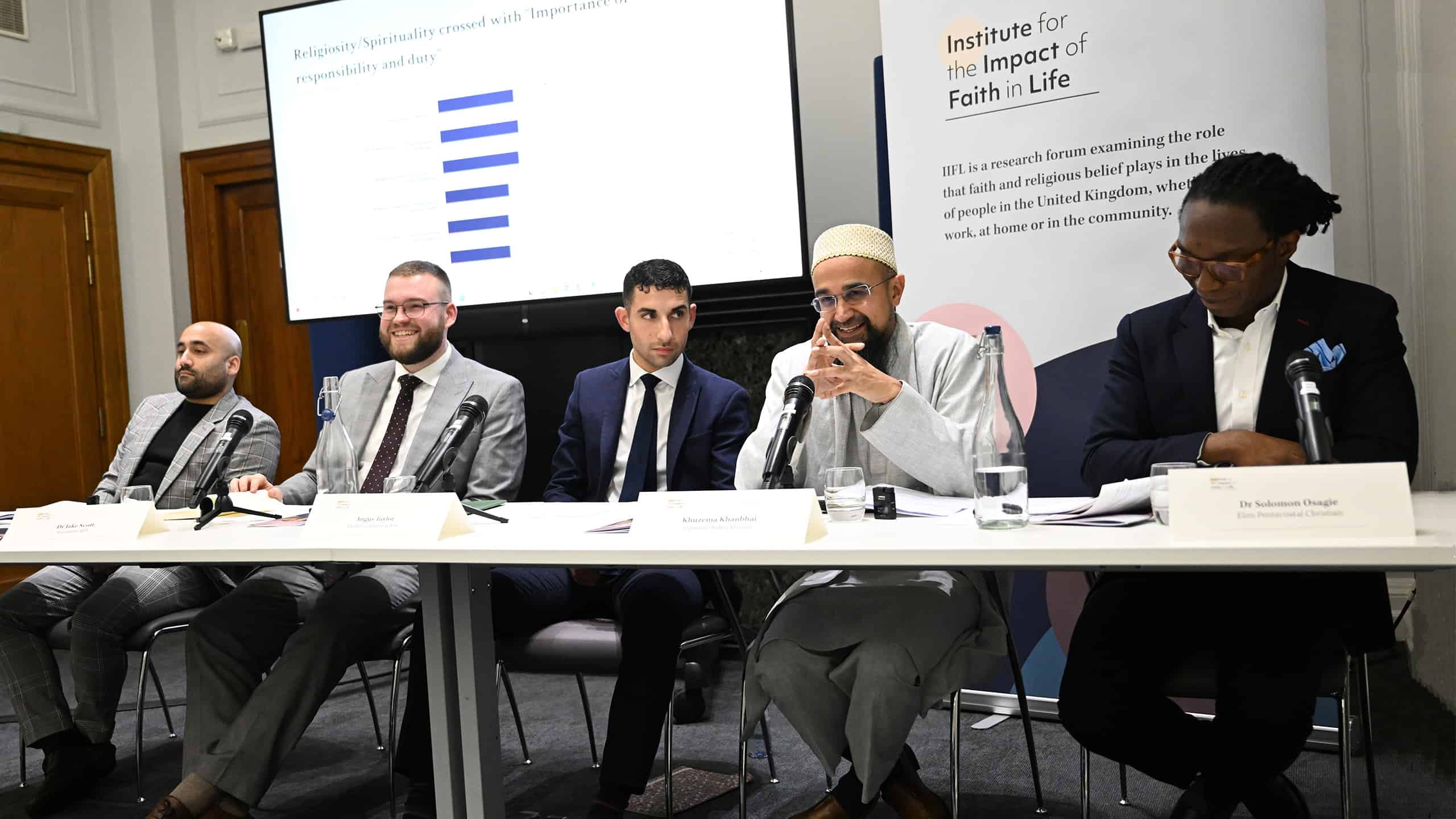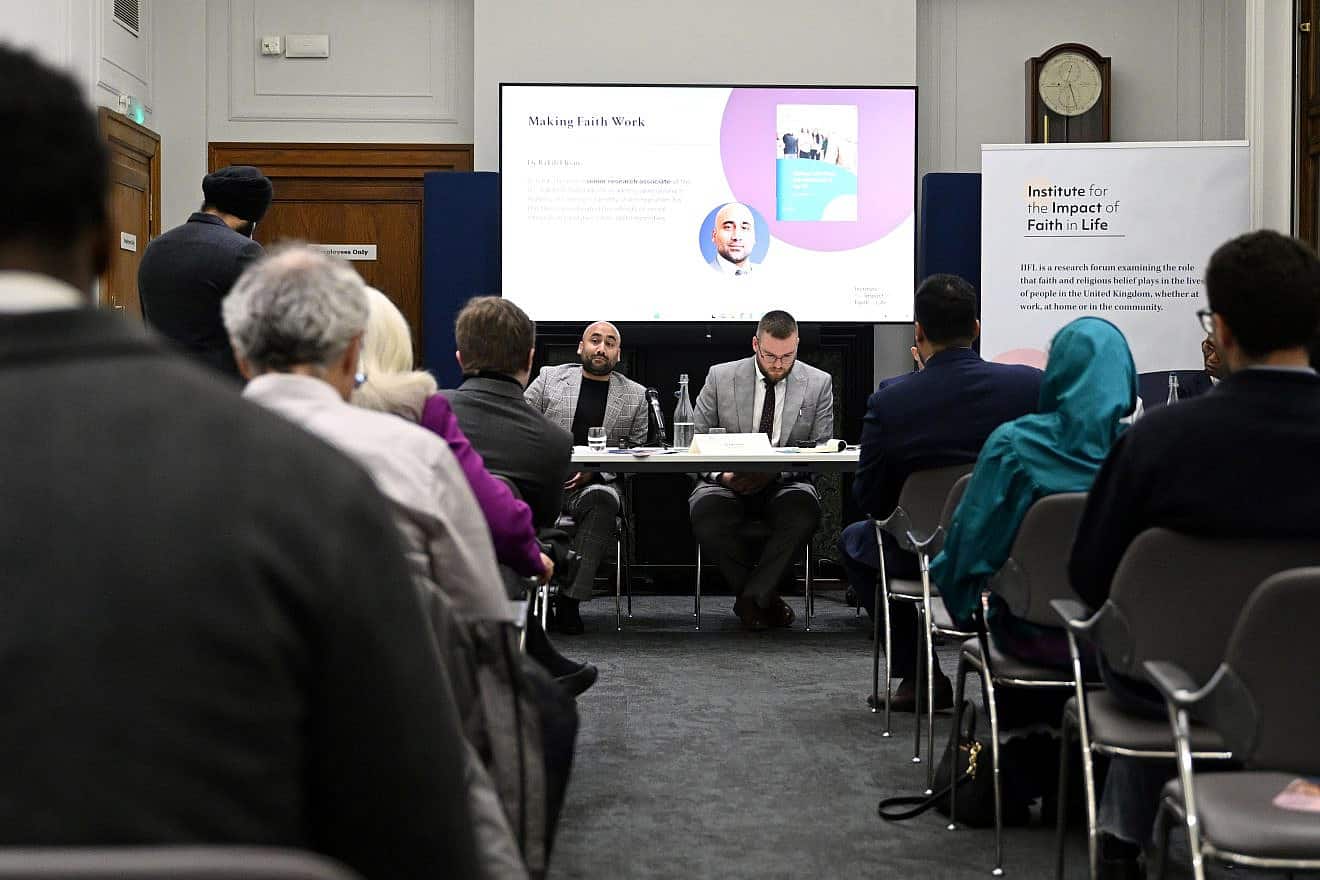Jake Scott, an Anglican Christian, and Rakib Ehsan, a Sunni Muslim, launched the Institute for the Impact of Faith in Life in London in November, shortly after Hamas terrorists killed some 1,200 people in southern Israel on Oct. 7.
“The idea evolved from our conversations as two friends,” Scott told JNS. “We spoke a lot with one another about there being more similarities between Islam and Christianity than between Christians and atheists, or Muslims and atheists.”
The institute’s goal is to examine “the role that faith and religious belief play in the lives of people in the U.K., whether at work, at home or in the community.”
Scott, the institute’s secretary, told JNS that he and co-founder Ehsan became aware of the need for “mature public conversation” in the United Kingdom about similarities between religions, “to dispel misunderstandings of faiths and to increase and raise awareness of the role that faith plays in life.”
‘A British success story’
Although many recognize that there is a relationship between faith and positive life outcomes, Scott told JNS that “surprisingly little research” has studied that connection in the United Kingdom.
The country is one of the world’s most secular, but it is becoming “more religiously diverse despite it,” Ehsan, who is the institute’s senior research associate, told JNS.
Scott added that there is a unique challenge in the United Kingdom, due to the state religion.
“Despite constitutional separations in the United States, religion remains a vibrant central component of public discourse,” he said. “I think understanding the role of faith becomes imperative in a society, where the separation of faith and state demands a clear case for the impact of faith on life.”
“In the U.K., this need has seemed less pronounced,” he said.
The institute debuted last fall and held a launch event in November at One Birdcage Walk, a stone’s throw from the Houses of Parliament. Guests included scholars, diplomats and clergy.
Scott told JNS he was pleased with the “cross-faith” approach of the launch event, which featured a Pentecostal Christian, a Muslim and a modern Orthodox Jew. “We appreciate having a format where people from many faith backgrounds can celebrate what they have in common,” he said.
There was also a “lively” discussion of the institute’s recent report on faith and job satisfaction, which suggested that 73% of religious British workers believe that their employer respects their beliefs and practices.
“We, and many of our supporters, obviously see this as a British success story, especially as most headlines relating to religion nowadays are negative,” Scott said.

Uncertain future
As with any startup, the young institute faces an uncertain future, Scott told JNS. “This is a pilot year, and we will see what the future holds,” he said. “We are keen to delve more in-depth about various faith communities, including British Jews, going forward.”
When it comes to British Jews, he and colleagues want to explore “the complexity of different types of Jewish identity,” Scott said. “The idea of an ethno-religion was, of course, familiar to the ancient Israelites and their neighbors, but in the modern West, it often confuses people.
“I think many non-Jewish people are confused about how Judaism is a faith but also a nation and ethnicity, which impacts their perception of what antisemitism is and is not, rightly or wrongly,” he added. “One may be a Jewish atheist for example, in the way that one cannot really be a Christian atheist. Although there are of course many people that profess affinity to this or that religion without necessarily believing in or observing all of its commandments.
“It would be fascinating to delve into those layers of identity, and how they might impact the outlook and lifestyle of different Jewish people in Britain,” Scott said.
Changing religious landscape
The institute’s launch comes amid stark religious change in the United Kingdom, which until recently was overwhelmingly Christian, Scott said.
“Even in the 2001 census, approximately 74% of adults identified as such. This figure dropped below half for the first ever time in 2021,” he said. “These people are not vanishing. They are overwhelmingly becoming atheists, which over 40% of Brits now identify as.
“We believe that better understanding will lead to greater interfaith harmony and social cohesion,” Scott said. “It is often fashionable to bash religion, but it should be obvious that we have a lot to celebrate and respect.
“Most food banks in the UK are run by churches and other faith organizations,” he added, noting that the British education system is a legacy of medieval and early modern religious schools. He also said that there is data showing that students at religious schools outperform counterparts at secular ones. (Other studies suggest that is not the case.)
“This cannot be a complete coincidence,” he said.
“Just as a fish does not think about the water it swims in, we in Britain do not always realize that religion is essential to our history and so many of our communities,” Scott said. “With secularism rising but minority religions on the rise, what will our future overarching values look like? Will it be better or worse, or simply different?”


























